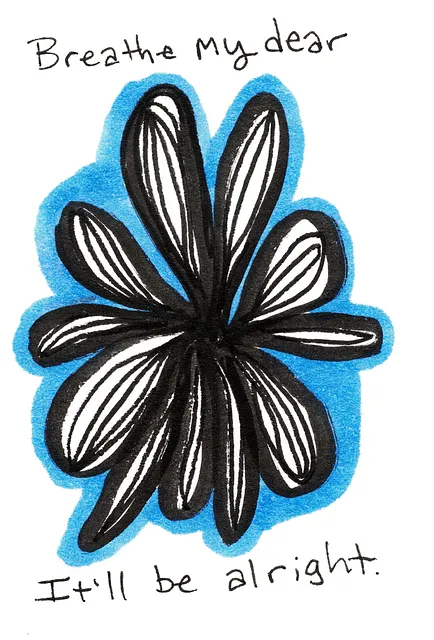The media's portrayal of mental health significantly impacts public perception, with positive depictions from sources like Westminster Kaiser Permanente behavioral health services fostering empathy and encouraging help-seeking behaviors. Conversely, negative stereotypes can lead to discrimination and barriers to care for marginalized communities. To address these disparities, a comprehensive policy analysis and advocacy approach focusing on diverse narratives and media literacy is crucial. This strategy promotes better public understanding, support for anxiety relief strategies, and improved access to quality behavioral health services. Westminster Kaiser Permanente's holistic approach emphasizes patient empowerment through therapy and support groups, reducing stigma, and ensuring safe, effective care. Collaboration between these services and media outlets can dispel stereotypes, promote accurate representation, and raise awareness about behavioral health through real-life stories and evidence-based resources.
“The media’s influence on mental health perception is profound, making accurate representation crucial. This article explores strategies to challenge stereotypes and promote understanding. We delve into the impact of media portrayal, showcasing initiatives like Westminster Kaiser Permanente Behavioral Health Services, known for its holistic approach. By implementing empathetic depictions, we can foster positive change. Collaborating with media entities is key to shaping a more inclusive narrative, ensuring mental illness is represented accurately and sensitively.”
- Understanding the Impact of Media Portrayal on Mental Health Perception
- Westminster Kaiser Permanente Behavioral Health Services: A Holistic Approach to Representation
- Strategies for Accurate and Empathic Mental Illness Depictions in Media
- Fostering Positive Change: Collaborating with Media for Better Representation
Understanding the Impact of Media Portrayal on Mental Health Perception

The media plays a significant role in shaping public understanding of mental health issues. Positive and accurate representation in films, television shows, and news outlets can foster empathy, reduce stigma, and encourage individuals to seek Westminster Kaiser Permanente behavioral health services. Conversely, negative or stereotypical portrayals can perpetuate misconceptions, leading to increased discrimination and barriers to care. This impact is particularly profound for marginalized communities, where cultural sensitivity in mental healthcare practice is essential.
A comprehensive mental health policy analysis and advocacy approach is necessary to address these disparities. By promoting diverse narratives and encouraging media literacy, we can ensure that the media accurately reflects the experiences of those living with mental illness. This, in turn, can contribute to better public understanding and support for effective anxiety relief strategies, ultimately improving access to quality behavioral health services for all.
Westminster Kaiser Permanente Behavioral Health Services: A Holistic Approach to Representation

Westminster Kaiser Permanente Behavioral Health Services stands as a beacon of hope and accurate representation in media portrayal of mental illness. Their holistic approach prioritizes the well-being of individuals, focusing on both the mind and body. This comprehensive strategy involves not only treating symptoms but also empowering patients with coping skills development through therapy and support groups. By fostering an environment that encourages open dialogue about mental health challenges, they aim to reduce stigma and promote positive thinking.
Moreover, Westminster Kaiser Permanente recognizes the importance of risk management planning for mental health professionals. They provide resources and guidance to ensure practitioners are equipped to handle diverse patient needs safely and effectively. This proactive approach not only benefits patients but also strengthens the overall mental health care system by addressing challenges proactively rather than reactively.
Strategies for Accurate and Empathic Mental Illness Depictions in Media

Media has a powerful influence on shaping societal perceptions and attitudes towards mental illness. To foster understanding and empathy, accurate and empathetic portrayals in media are crucial. This involves employing strategies that reflect the complexity and diversity of mental health experiences while avoiding stereotypes and misinformation.
Westminster Kaiser Permanente behavioral health services emphasize the importance of nuanced representations that showcase the inner strength development of individuals navigating their mental health journeys. By incorporating real-life stories and collaborating with experts, media can enhance awareness and promote mental illness stigma reduction efforts. Additionally, focusing on conflict resolution techniques within storylines can humanize characters and encourage viewers to recognize the signs and symptoms of various mental illnesses.
Fostering Positive Change: Collaborating with Media for Better Representation

In the pursuit of fostering positive change, collaboration between mental health organizations and media outlets is a powerful strategy. Westminster Kaiser Permanente behavioral health services can play a pivotal role in this process by engaging with media professionals to shape the narrative around mental illness. By partnering, these entities can challenge stereotypes, promote accurate representation, and raise awareness about various aspects of behavioral health. This collaborative approach allows for the integration of Inner Strength Development strategies within media content, showcasing real-life experiences and recovery stories that inspire hope and understanding.
Such partnerships can also facilitate the exchange of Communication Strategies tailored to different audiences. Media platforms have a unique ability to convey complex information in accessible formats, empowering individuals to seek support when needed. Moreover, by involving behavioral health experts in content creation, these outlets can enhance their programming with evidence-based Coping Skills Development resources, providing valuable tools for viewers navigating mental health challenges. Together, these efforts contribute to a more nuanced and empathetic portrayal of mental illness in the media landscape.
In conclusion, accurate representation of mental illness in media is a powerful tool to combat stigma and foster empathy. By learning from initiatives like Westminster Kaiser Permanente Behavioral Health Services’ holistic approach and implementing strategies for empathetic portrayals, we can create a more inclusive narrative that promotes positive mental health perceptions. Collaboration between media outlets and mental health professionals is essential to drive meaningful change and ensure stories are told with authenticity and care.






